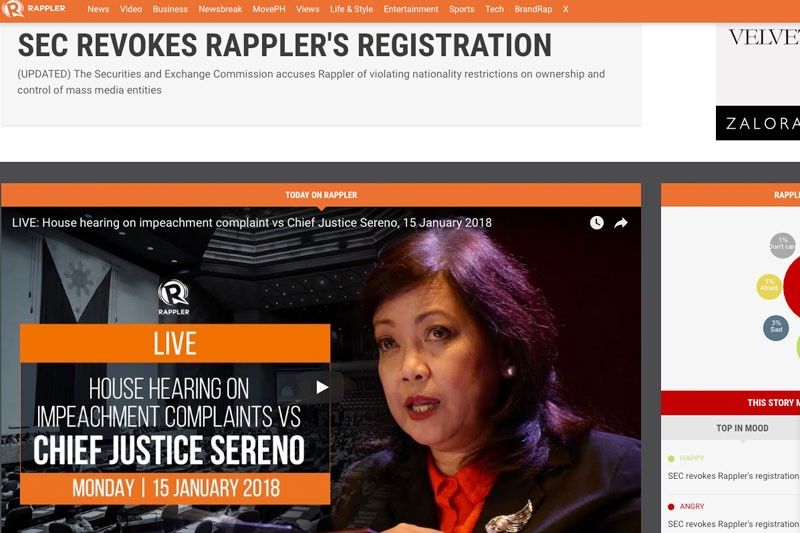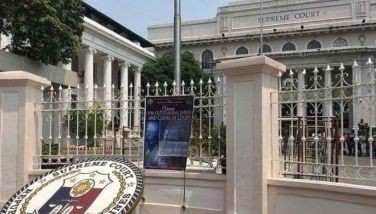SEC orders Rappler to shut down

In what Rappler said was a major blow to press freedom, the SEC cancelled the multimedia news organization’s license, accusing it of effecting a “deceptive scheme to circumvent the Constitution” especially through its getting funds from Omidyar Network of eBay founder Pierre Omidyar. File
MANILA, Philippines — Less than a year after President Duterte called Rappler’s attention to its alleged American ownership, the Securities and Exchange Commission (SEC) yesterday revoked the media entity’s corporate registration, saying it violated constitutional provisions on foreign ownership.
In what Rappler said was a major blow to press freedom, the SEC cancelled the multimedia news organization’s license, accusing it of effecting a “deceptive scheme to circumvent the Constitution” especially through its getting funds from Omidyar Network of eBay founder Pierre Omidyar.
The decision, dated Jan. 11, canceled Rappler’s certificate of incorporation and the Omidyar Philippine Depository Receipts (PDRs).
PDRs are instruments that give foreign investors a passive economic interest in a Philippine company.
However, the SEC claimed that one of the so-called PDRs issued by Rappler does not function that way, as it effectively gives veto power to a foreign company.
Rappler, in a statement posted on its website, said it would contest the SEC’s decision in court.
“We thought this day would never come, even as we were warned in the first of week of December last year that the SEC would be handing down a ruling against us…. The SEC’s kill order revoking Rappler’s license to operate is the first of its kind in history – both for the Commission and for Philippine media,” Rappler said.
“What this means for you, and for us, is that the Commission is ordering us to close shop, to cease telling you stories, to stop speaking truth to power, and to let go of everything that we have built – and created – with you since 2012,” it also said.
Rappler’s coverage of the Duterte administration’s bloody drug war, cited by several foreign media entities, has earned the ire of Duterte, who consistently threatened to close the media company.
The SEC conducted its investigation after the Office of the Solicitor General (OSG) wrote the agency on Dec. 14, 2016, about the PDRs.
Solicitor General Jose Calida lauded the SEC decision. “I applaud the SEC for revoking Rappler’s certificate of incorporation. This decision demonstrates that even influential media outfits cannot skirt the restrictions set forth in the Constitution,” he said in a statement. Calida also vowed to defend the SEC ruling before any court.
“Rappler is free to seek redress before our courts. The OSG is ready to defend the sound decision of the SEC in any forum,” he added. Aside from Omidyar Network, the other foreign investors brought into Rappler through PDRs was North Base Media, a fund for independent journalism founded by three prominent foreign journalists.
SEC Commissioner Antonieta Ibe said the decision was carefully reached and should not be seen as an attack on the media.
“There was continuous deliberation by the lawyers. It was really studied,” Ibe said. Duterte’s spokesman Harry Roque said the President’s office respected the decision of the SEC, which is empowered to determine the legality of corporations.
“We respect the SEC decision that Rappler contravenes the strict requirements of the law that the ownership and the management of mass media entities must be wholly owned by Filipinos,” Roque said. “Rappler may wish to exhaust all available legal remedies until the decision becomes final,” he added.
According to the 1987 Philippine Constitution, ownership and management of media “shall be limited to citizens of the Philippines, or to corporations, cooperatives or associations, wholly owned and managed by such citizens.”
On July 25, 2017, during his SONA, President Duterte said, “Rappler, try to pierce the identity and you will end up American ownership.”
But Rappler said PDRs do not indicate ownership.
“This means our foreign investors, Omidyar Network and North Base Media, do not own Rappler. They invest, but they don’t own. Rappler remains 100 percent Filipino-owned,” Rappler said in a statement after Duterte’s 2017 SONA.
Asked if this SEC ruling would also affect the status of GMA and ABS-CBN, which also issued PDRs to foreign investors, an SEC insider said it would not.
“ABS-CBN and GMA PDRs are all true passive investments which the SEC has opined as being permissible without violating the nationality provisions of the Constitution. The problem with Rappler is they issue a set of PDRs that gave a foreign entity negative control or veto power,” the SEC insider told The STAR.
The National Union of Journalists of the Philippines (NUJP), an organization of Filipino journalists, said it is outraged by the SEC’s decision.
“The SEC has apparently decided to reject Rappler’s contention that its foreign investors merely placed money in the outfit but do not own it, which it issued after President Duterte, in his state of the nation address last year, threatened to have its ownership investigated,” NUJP said.
Not yet final
SEC spokesman Armando Pan said the decision is not yet final and executory and Rappler may file an appeal within 15 days.
“Aware of the constitutional restrictions, and yet eager to receive capital from its ‘global impact investors,’ Rappler Inc. created an alter ego that would validate the transfer of control. So that no ‘equity’ per se would be transferred, the alter ego would issue an equity derivative,” read the ruling.
“Reasonable persons who read paragraph 12.2.2 of the ON PDR would agree that there is some control – definitely not zero – granted to the foreign holder. It clearly states that when a corporate action would affect the PDR holders, the stockholders must consult the ON PDR holders and obtain their approval,” it added.
The SEC said Rappler erred when it equated “control” with ownership of stocks or management in the board.
“Upon this premise, they devised a scheme where no foreigner would own stock or sit on the board. The scheme employed by respondents – making the ownership and management appear ‘Filipino’ on paper, while granting control (i.e. influence over corporate policy) to foreign investors via the terms of an equity derivative – is not a harmless circumvention,” it added. – Paolo Romero, Romina Cabrera, Edu Punay, Alexis Romero, Kurt dela Peña, Reuters
- Latest
- Trending




























